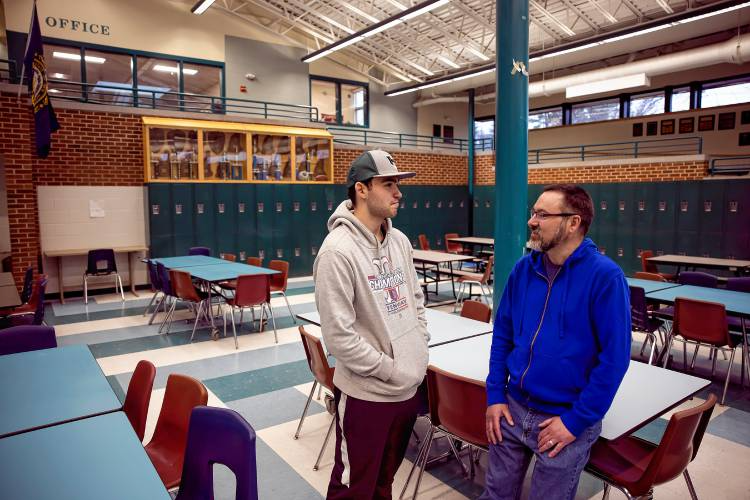“To understand why we are talking about race and food, because it doesn’t seem like they are connected, we need to understand how the food system got to be the way it is,” said Leah Penniman, a guest speaker who lectured in the Memorial Union Building (MUB) this past Tuesday evening at 7 p.m. in the Granite State Room. “I will argue that the food system is not broken; it is working exactly as it was designed. If you were to imagine the food system as having DNA, that double helix, one strand would be stolen land, and the other strand would be exploited labor.”
According to Leah Penniman, the founding co-director of Soul Fire Farm, many practices that have been braided into the United States’ food system come from afro-indigenous knowledge. Penniman, who recently published the book “Farming While Black: Soul Fire Farm’s Practical Guide to Liberation of the Land,” was the selected speaker for this year’s Martin Luther King Tribute.
Colleen Flaherty, the communications coordinator for the Sustainability Institute, was the first of four speakers who helped to welcome Penniman to the stage. Following Flaherty was Monica Chiu, the interim associate vice president for community, equity and diversity, who spoke briefly about the history of farming while Asian; Karen Spiller, who spoke briefly to urge attendees of the event to sign up for the Racial Equity Challenge, a 21-day online program that helps to educate people on racial equity; and junior biomedical science major and Sigma Alpha president Kayla Caires, who vocalized how agriculture is an important part of her life and stated her excitement for event attendees to hear about how Penniman promotes agricultural leadership to minority groups in her community.
Penniman took time to thank the Abenaki people who originally inhabited the land that the talk was being conducted upon. She also thanked her ancestors for not giving up on their descendants even when times were tough. She also thanked her team at Soul Fire Farm for making it possible for her to be at the University of New Hampshire to give her talk.
Throughout her lecture, Penniman took her audience on a “journey through history.”
Penniman described this history as sad and jarring, but assured her audience that the food system can be corrected and healed and that they can become involved.
Penniman informed her audience that many things, including the fact that people in the United States consider to be ahistorical, are actually founded on the basis of afro-indigenous knowledge.
“[For] black folks, our relationship with farming isn’t just slavery; it goes back at least 10,000 years and a lot of the things that we as sustainable farmers think of as ahistorical like raised beds, cover cropping, terraces, livestock rotational grazing, chickens themselves, fermentation, work parties, credit unions, land trust… they are all afro-indigenous knowledge,” she said. “A big part of healing is remembering.”
Penniman discussed points in history that were significant in terms of black and brown people and their relationship with farming, including the time period around the Emancipation Proclamation and how it led to the criminalization of many African Americans due to soliciting. Incarcerated African Americans were then legally allowed to be used for slave farm labor.
She also discussed how 1910 was the peak time period for farmland ownership by black people, and how it was correlated with 1910 being the peak time period for white supremacist violence in the South. 4,500 people were lynched in this time period for disrupting the status quo of the time.
Penniman went on to describe how the USDA is the number one cause for the decline of the black farmer.
“The federal government has given away millions of acres of land through the Homestead Act, provided free education through the land grant colleges, low interest loans, crop allotments, crop insurance and technical assistance through the extension agency to help support white farmers getting an economic footing,” she said. “Black farmers were systematically denied these supports, creating an unfair market. In 1982, the US Commission on Civil Rights said, ‘the extinction of the black farmer will be the blood on the hands of the USDA.’”
According to Penniman, when farmers are not using cultural knowledge or the afro-indigenous methods that were braided in, agriculture is the number one driver of climate change because farmers are neglecting and appropriating sacred knowledge.
Penniman encouraged the event attendees to get involved with the discussion. A call and response was encouraged by Penniman as she shouted “free the people” and her audience responded with “free the land.” Penniman also encouraged the audience to talk amongst themselves and share pieces of their own ancestry with one another for a couple of minutes in the middle of her talk.
She also encouraged attendees to get involved to make a change in the real world.
“You can’t be a passive anti-racist,” she said.
Penniman talked about how through Soul Fire Farm, community members who need food the most will receive hand-delivered goods from the farm every Wednesday. She said that the idea to do this was inspired by the Black Panthers, who conducted survival programs which helped to feed 20,000 Oakland children breakfast every morning.
“Like us, they were rooted in the idea that we can’t just have this theoretical stuff going on, we have to do something real for the community,” she explained.
She said that by growing the food and sharing it with the community the way that they do, it helps to make the world better.
“The earth and the humans have been friends, and we can be friends again,” Penniman said.
Penniman discussed how Soul Fire Farm helps to train those who identify as black, latinx and indigenous who couldn’t get into other training programs or find any that they could afford or that were within their region. She said the training and educational programs end up benefiting many communities of people are modeled after Freedom Farm founded by Fannie Lou Hamer.
Penniman said that Soul Fire Farm is also made up of the component of organizing and activism. The farm has trained people in uprooting racism, allowing people to use the farm as sanctuary for their organizing meetings regardless of the political work that they do, and specifically have formed a reparation map with the farm’s alumni and other comrades.
“Reparations is a very important concept, because if you don’t think about reparations, you’re assuming that history doesn’t exist and we are starting from today,” she said. “It’s a people-to-people voluntary reparation.”
According to Penniman, there is something that everyone can do to help encourage racial justice. A platform for what people can do to help can be found at: www.soulfirefarm.org/support/take-action/.
Audrey Hart, a sophomore marine biology and education major and an attendee of the event, said her favorite part of Penniman’s lecture was how she talked about how the Earth was alive and that we need to respect it because of this. She also expressed that having events and discussions that help to inform a majority-white campus of diverse issues is important.
“Having events like this, being [a white person] and realizing that I’m a majority and am stuck in that community, it is meaningful for me personally,” Hart said. “I’m sure that people of color and minority groups especially on campus can really appreciate this [as well].”
To conclude Penniman’s discussion, Taina Asili, a board member of Soul Fire Farm, entered the stage and sang a song entitled “Plant the Seed” which was written for and inspired by Penniman’s work with Soul Fire Farm.
“This is my declaration to be fully alive, this is my reclamation of my ancestral wisdom, the Earth, it saved it for me, and I plant the seed,” Asili sang.
Follow Us on Twitter
Farming while black
February 28, 2019
Leave a Comment
More to Discover





















